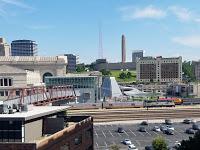 Kansas City is located in the epicenter of the continental United States and practically equidistance to our borders in each direction. For that reason, the City of Fountains became a central transportation hub for people and livestock with the latter terminating at the Kansas City Stockyards. The stockyards originated on the Kansas side but quickly spread into Missouri and at its peak in 1923 2,631,808 cattle; 2,736,174 hogs; 1,165,606 sheep; 377,038 calves; and 42,987 horses and mules were received at the stockyards (1). Nearby the Crossroads neighborhood developed that supported the spoils of this industry with numerous buildings now listed on the National Register of Historic Places, such as the TWA Corporate Headquarters Building, Western Auto Building, and Firestone Building. However due to the devastating 1951 flood, by the 1960s, the large packing companies had closed most of their plants and relocated - severely affecting each neighborhood.
Kansas City is located in the epicenter of the continental United States and practically equidistance to our borders in each direction. For that reason, the City of Fountains became a central transportation hub for people and livestock with the latter terminating at the Kansas City Stockyards. The stockyards originated on the Kansas side but quickly spread into Missouri and at its peak in 1923 2,631,808 cattle; 2,736,174 hogs; 1,165,606 sheep; 377,038 calves; and 42,987 horses and mules were received at the stockyards (1). Nearby the Crossroads neighborhood developed that supported the spoils of this industry with numerous buildings now listed on the National Register of Historic Places, such as the TWA Corporate Headquarters Building, Western Auto Building, and Firestone Building. However due to the devastating 1951 flood, by the 1960s, the large packing companies had closed most of their plants and relocated - severely affecting each neighborhood.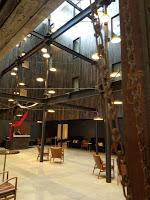 With the assistance of Visit KC and the Missouri Wine and Grape Board, our group extended our excursion into Missouri Wine with a visit to two wineries that have settled in a rejuvenated Cowtown and Crossroads Art District. I also spent free time walking to an assortment of breweries and distilleries closely clustered near our base at the Crossroads Hotel - a repurposing of a Pabst Brewing Depot constructed in 1911. At that time, "Percheron horse-drawn teams paraded the streets with wagons loaded with beer. When Prohibition came, KC political boss Tom Pendergast bought both buildings, using them as an office and, according to legend, to bootleg liquor". Here's a short overview of each craft beverage establishment.
With the assistance of Visit KC and the Missouri Wine and Grape Board, our group extended our excursion into Missouri Wine with a visit to two wineries that have settled in a rejuvenated Cowtown and Crossroads Art District. I also spent free time walking to an assortment of breweries and distilleries closely clustered near our base at the Crossroads Hotel - a repurposing of a Pabst Brewing Depot constructed in 1911. At that time, "Percheron horse-drawn teams paraded the streets with wagons loaded with beer. When Prohibition came, KC political boss Tom Pendergast bought both buildings, using them as an office and, according to legend, to bootleg liquor". Here's a short overview of each craft beverage establishment.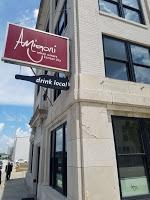
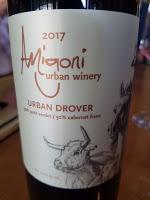 Amigoni Urban Winery is situated in rejuvenated Cowtown, specifically in the historic Daily Drover Telegram Newspaper building in the Stockyards District of the West Bottoms. In 2000, Michael and Kerry Amigoni first planting Cabernet Franc in their Leawood, Kansas backyard and later more European vinifera vines in land purchased in Centerview, Missouri. After launching commercially and realizing the Midwest was an erratic location for vinifera vines, they sought a more consistent supply of grapes from California’s Central Valley. The fruit arrives within 48 hours of harvest at the Stockyards production facility where Michael produces a plethora of interesting wines including a Cinsaut, Barbera, Tempranillo, and Sangiovese. Blended with 20% Cabernet, Cinsaut was well represented in their 2017 Urban Cepages ($20) -- a fruitful, earthy and approachable wine. Their 2017 Tribute Series - Urban Drover ($25) is a 50-50 blend of Cabernet Franc and Petit Verdot and memorializes the drover, a person who drives cattle or sheep to market. Expect more body and spices in this smooth wine.
Amigoni Urban Winery is situated in rejuvenated Cowtown, specifically in the historic Daily Drover Telegram Newspaper building in the Stockyards District of the West Bottoms. In 2000, Michael and Kerry Amigoni first planting Cabernet Franc in their Leawood, Kansas backyard and later more European vinifera vines in land purchased in Centerview, Missouri. After launching commercially and realizing the Midwest was an erratic location for vinifera vines, they sought a more consistent supply of grapes from California’s Central Valley. The fruit arrives within 48 hours of harvest at the Stockyards production facility where Michael produces a plethora of interesting wines including a Cinsaut, Barbera, Tempranillo, and Sangiovese. Blended with 20% Cabernet, Cinsaut was well represented in their 2017 Urban Cepages ($20) -- a fruitful, earthy and approachable wine. Their 2017 Tribute Series - Urban Drover ($25) is a 50-50 blend of Cabernet Franc and Petit Verdot and memorializes the drover, a person who drives cattle or sheep to market. Expect more body and spices in this smooth wine. 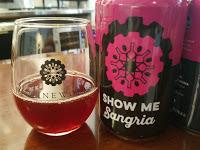
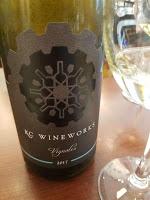 KC WineWorks was the first full-scale production winery established in the Crossroads Arts District. James and Lindsay Lowery utilize only Missouri-sourced grapes, many from the estate vineyard first planted in 2002 in Lowery's great-grandfather's farm from the 1870s. These grapes include many of the traditional Missouri wine grapes such as Chambourcin, Norton, Valvin Muscat, Chardonel, and Vignoles but expect very non-traditional styles and packaging. For instance, KC WineWorks was the first in the state to release a canned wine, the Show Me Sangria using a Crossroads White wine base (Chardonel, Vidal Blanc, & Vignoles) augmented with natural strawberry, raspberry, pear, and prickly pear juices. They are also trendsetters in releasing a trio of single vineyard Chambourcin wines, showcasing the specific climate and geology of each site. Still more, the Lowery's have a sparkling wine program producing a Sparkling Rosé ($29) using Chardonel and a Pét-Nat ($26) - both delicious. Finally, hard cider is on the menu through their Hopped Apfel - IPA aromas with funky apple flavors. But let's not forget their traditional wines, the 2015 Reserve Norton ($27) is very drinkable, slight spices and deep cherry flavors - avoiding astringent and jammy characters. And the 2017 Vignoles ($19) is everything you expect from a Missouri Vignoles, tropical notes paired with refreshing acidity.
KC WineWorks was the first full-scale production winery established in the Crossroads Arts District. James and Lindsay Lowery utilize only Missouri-sourced grapes, many from the estate vineyard first planted in 2002 in Lowery's great-grandfather's farm from the 1870s. These grapes include many of the traditional Missouri wine grapes such as Chambourcin, Norton, Valvin Muscat, Chardonel, and Vignoles but expect very non-traditional styles and packaging. For instance, KC WineWorks was the first in the state to release a canned wine, the Show Me Sangria using a Crossroads White wine base (Chardonel, Vidal Blanc, & Vignoles) augmented with natural strawberry, raspberry, pear, and prickly pear juices. They are also trendsetters in releasing a trio of single vineyard Chambourcin wines, showcasing the specific climate and geology of each site. Still more, the Lowery's have a sparkling wine program producing a Sparkling Rosé ($29) using Chardonel and a Pét-Nat ($26) - both delicious. Finally, hard cider is on the menu through their Hopped Apfel - IPA aromas with funky apple flavors. But let's not forget their traditional wines, the 2015 Reserve Norton ($27) is very drinkable, slight spices and deep cherry flavors - avoiding astringent and jammy characters. And the 2017 Vignoles ($19) is everything you expect from a Missouri Vignoles, tropical notes paired with refreshing acidity. 
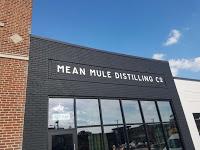 Mean Mule Distilling Co was frequently mentioned throughout our trip and was the impetus behind this walking tour of the Crossroads neighborhood. The references referred to their Silver Mean Mule American Agave Spirit, a rare example of an American made agave spirit. Not a Tequila by technical definition, this distillate, made from the syrup of 100% weber blue agave, possesses similar characteristics as its southern brethren. It lacks smokiness and funky - but packs plenty of smooth agave flavor. The distillery also resuscitates a family history of distilling as its name refers to the mean mule that stood upon the false floor hiding the family's distilling operation during Prohibition.
Mean Mule Distilling Co was frequently mentioned throughout our trip and was the impetus behind this walking tour of the Crossroads neighborhood. The references referred to their Silver Mean Mule American Agave Spirit, a rare example of an American made agave spirit. Not a Tequila by technical definition, this distillate, made from the syrup of 100% weber blue agave, possesses similar characteristics as its southern brethren. It lacks smokiness and funky - but packs plenty of smooth agave flavor. The distillery also resuscitates a family history of distilling as its name refers to the mean mule that stood upon the false floor hiding the family's distilling operation during Prohibition. 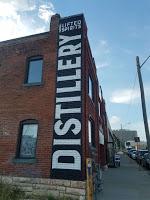
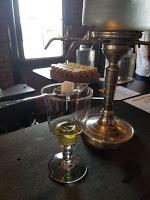 Lifted Spirits joins the Crossroads Hotel in once being associated with horses as the distillery was originally a stable for the Smith Brothers Steam Bakery. In the late 1800s, these horses delivered bread throughout Kansas City. Today Lifted Spirits utilizes grain in a different process, using soft red wheat from a small family farm in Wellsville, KS to produce French-inspired spirits like Absinthe. Their version includes wormwood and other botanicals and is served using the traditional French drip method with a Pontarlier glass and a sugar cube. I've learned to enjoy this spirit, both its history and flavor, and the Lifted Spirits Absinthe is no exception.
Lifted Spirits joins the Crossroads Hotel in once being associated with horses as the distillery was originally a stable for the Smith Brothers Steam Bakery. In the late 1800s, these horses delivered bread throughout Kansas City. Today Lifted Spirits utilizes grain in a different process, using soft red wheat from a small family farm in Wellsville, KS to produce French-inspired spirits like Absinthe. Their version includes wormwood and other botanicals and is served using the traditional French drip method with a Pontarlier glass and a sugar cube. I've learned to enjoy this spirit, both its history and flavor, and the Lifted Spirits Absinthe is no exception.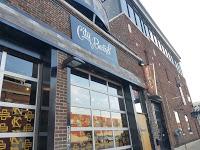 City Barrel was founded by a trio who had determined there was a missing link in the Kansas City brewing scene. As their website states, "No one was focusing on long-aged sours, crazy IPA’s and wild fermentation beers and creating a culinary experience". The tasting room is a literal work of art as the backdrop behind the bar is made from reclaimed wood from the Nelson Atkins Museum of Art. And local craftsman built custom tables and chairs made of Missouri white oak -- the same wood as our Foeders sour beer tanks. And sours galore, there were four available and I selected the tasty Foeder Blend #1 - Missouri White Oak Foeder-aged golden sour.
City Barrel was founded by a trio who had determined there was a missing link in the Kansas City brewing scene. As their website states, "No one was focusing on long-aged sours, crazy IPA’s and wild fermentation beers and creating a culinary experience". The tasting room is a literal work of art as the backdrop behind the bar is made from reclaimed wood from the Nelson Atkins Museum of Art. And local craftsman built custom tables and chairs made of Missouri white oak -- the same wood as our Foeders sour beer tanks. And sours galore, there were four available and I selected the tasty Foeder Blend #1 - Missouri White Oak Foeder-aged golden sour. 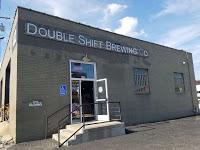 Double Shift Brewing opened in 2015 by a local firefighter who practically ran double shifts in opening this five-barrel brewhouse. The brewery is located in an old bicycle shop which provides another reference to the brewery's name. I drank a pint of their well made and refreshing Kolsch at the Percheron rooftop bar at the Crossroads Hotel and had a small pour of the Ordiata Horchata Milk Stout. It was creamy smooth and quite delicious.
Double Shift Brewing opened in 2015 by a local firefighter who practically ran double shifts in opening this five-barrel brewhouse. The brewery is located in an old bicycle shop which provides another reference to the brewery's name. I drank a pint of their well made and refreshing Kolsch at the Percheron rooftop bar at the Crossroads Hotel and had a small pour of the Ordiata Horchata Milk Stout. It was creamy smooth and quite delicious.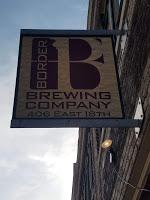 Border Brewing Co is the handiwork of Eric Martens, who leveraged his home brewing and chemical engineer skills to open the brewery in 2015. Furthermore, he and his co-owner wife Tracy had to navigate the legal environment as they were the first brewery in Kansas City to brew and sell on-site with no kitchen and no beer distribution. Their lineup covers most of the craft beer map and I focused in our their Pub Dweller Nitro ESB - just like being in a pub in London.
Border Brewing Co is the handiwork of Eric Martens, who leveraged his home brewing and chemical engineer skills to open the brewery in 2015. Furthermore, he and his co-owner wife Tracy had to navigate the legal environment as they were the first brewery in Kansas City to brew and sell on-site with no kitchen and no beer distribution. Their lineup covers most of the craft beer map and I focused in our their Pub Dweller Nitro ESB - just like being in a pub in London.See other posts of this trip at Missouri Wine.
1) How KC became 1 of great stock markets of the world
